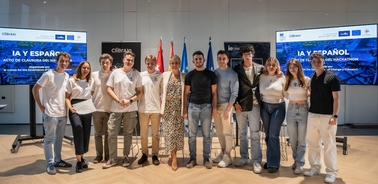- Home
- News And Events
- News
- Neural Nomads, Winner Of Ie University And Clibrain’s Ai And Y Español Hackathon
Neural Nomads, winner of IE University and ClibrAIn’s AI and y Español hackathon

The event was opened by Diego del Alcázar Benjumea, CEO of IE University, and was closed by Carme Artigas, Secretary of State for Digitalization and AI.
Neural Nomads has won the first AI y Español hackathon, organized by IE University’s Center for the Governance of Change and ClibrAIn. Neural Nomads provides an advanced AI software-as-a-service (SaaS) capable of storing documents and texts in a private database for later consultation via chat. The first hackathon on AI and Spanish attracted more than 100 students, distributed in 11 teams and was held for 36 hours both remotely and in person at IE University. The event was opened by Diego del Alcázar Benjumea, CEO of IE University, and was closed by Carme Artigas, Secretary of State for Digitalization and AI.
Elena González Blanco, research director of LyrAIcs at the Center for the Governance of Change and CEO of ClibrAIn, presented the LyrAIcs project, the first song recommender in Spanish using artificial intelligence. After her address, a round table was held to discuss the situation of Spanish in the global framework of AI application developments. Participants included Guillermo Escribano, general director of Spanish in the world at MAUEC; Maria Grandury, founder of SomosNLP.org, and Alfonso Ureña López, president of the Spanish Society for Natural Language Processing (SEPLN). The panel, which highlighted the economic and cultural implications of AI development and also raised ideas for improving the place of Spanish in this field, was moderated by David Villalon, co-founder of ClibrAIn.
“AI does not yet speak Spanish well in all its linguistic varieties. We have a unique opportunity to teach and train it, but to do so we have to pull together.”
Elena González Blanco, Research Director of LyrAIcs at the Center for the Governance of Change and CEO of ClibrAIn
“There is still a long way to go and it is essential that we build corpora to train it in all specialized domains, as well as in the different geographical variants, mainly in Latin America,” said Elena González Blanco.
Carme Artigas, Spain’s Secretary of State for Digitalization and AI, advocated an ethical and humanistic perspective to educating ourselves and our children in a world dominated by AI. During her speech at the closing of the event, she argued that we are facing a new humanism, in which people will have the ability to create and develop a society where we will set the limits.
A commitment to exploring the possibilities of AI
As part of the growing debate on the possibilities and challenges of AI, IE University recently presented its Manifesto on Artificial Intelligence, a statement in which the institution, recognized as one of the most innovative in the world, reaffirms its commitment to this field. This document highlights the main programs, initiatives and research projects that IE University promotes to enrich the learning experience of students, broaden their training and develop their skills with critical thinking, cultivate an analytical mindset and a humanistic perspective of innovation. IE University has a group of professors researching the possible applications of AI in different fields and has developed projects such as Lyraics, among others.
A pioneer in online training for the last 20 years, IE University promotes AI learning in its programs and masters, reflecting its innovative character. It has also consolidated its position as one of the main forums for debate on Artificial Intelligence. Recently San Altman, founder of OpenAI, the company that created ChatGPT, visited the university to discuss with students and developers the challenges and use of this new technology.